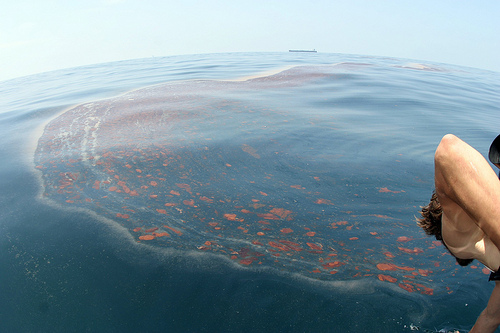New Zealand
-
Critical List: Leaking New Zealand oil tanker could break apart; EPA to speed Great Lakes cleanup
Eeek. A huge crack has opened up in the hull of the ship leaking oil off the coast of New Zealand, and the ship could break up apart "at any point," according to Maritime New Zealand.
In the U.S., the Justice Department had to sue Transocean to force the company to answer government subpoenas related to the Macondo well spill.
Can we feed people without killing the planet? Yes, says a new study, but it’ll take money, planning, and eating less meat.
-
Oil spill is New Zealand’s worst-ever environmental disaster at sea
It's bad when a tanker strikes a reef. It's worse when that tanker is carrying oil that starts tarring some of your country's nicest beaches. It's even worse when bad weather makes more oil leak from that tanker.
That's the series of increasingly problematic events that's been unfolding off the New Zealand coast, and the country's government is now calling it the worst maritime environmental disaster they've ever dealt with. The weather is keeping response crews from doing their thing, and birds and seals are both at risk. Plus, in addition to oil, the tanker was carrying smaller quantities of materials like ferrosilicon, which have the potential to wreak havoc in their own special way.
-
Critical List: Spilt oil tars New Zealand shores; climate change is a top issue for Europeans
Oil has reached New Zealand beaches, after an oil tanker ran into a reef last week. The tanker was carrying 1,700 tons of oil and 200 tons of diesel.
All these attacks on obscure regulations about boilers and concrete might seem boring, but in reality, they're part of a campaign that could destroy decades of environmental progress.
Europeans think that climate change is one of the top two issues facing the globe. (Although the No. 1 concern was a sort of Voltronesque mega-problem: poverty, hunger, and lack of drinking water.)
Rick Perry used to be against ethanol, but now he's in Iowa, so … he's not sure what he thinks.
-
Using markets to make fisheries sustainable
Around the world, over-fishing is leading to severe depletion of valuable fisheries. This is as true in U.S. coastal waters as it is in many other parts of the world. In New England waters, for example, after two decades of ever more intensive fishing, the groundfish fishery has essentially collapsed. But, we are not alone. […]
-
New Zealand conservative party introduces green agenda
New Zealand’s center-right National Party released its proposed environmental agenda last week. The center-left Labour Party and the Green Party both denounced it as tepid. Check out what’s included, and imagine for a moment that it had been offered by Republicans in Congress: • A legislated target of 50 per cent reduction in carbon emissions […]
-
Notable quotable
“I’ll retract the rape complaint from the wombat, because he’s pulled out. Apart from speaking Australian now, I’m pretty all right you know. I didn’t hurt my bum at all.” — New Zealander Arthur Cradock, who was subsequently charged with “using a phone for a fictitious purpose”
-
Tourism and carbon neutrality
This story is critical -- another datum showing that the global jet travel binge is both global suicide and homicide all at once, complete with pre-flight thuggery from the TSA* and a side dish of helping-promote-coal-to-liquids on the side (there was another story today about the U.S. (Ch)Air Force's new plan for dealing with peak oil: burn liquified coal / natural gas mixtures).
-
Better management is needed before closing fisheries is the only option left
About thirty years ago, diners around the world developed a taste for the low-fat white meat of a large pelagic fish known as a slimehead. The name was changed to orange roughy, and a delicacy was born.
Unfortunately for the orange roughy, its long lifespan (a hundred years or more) and its late arrival to sexual maturity (at 20 years or more) has made it vulnerable to overfishing. As its popularity in fine restaurants has grown, orange roughy populations have nosedived. And just this week, Australia and New Zealand (the world's largest producer of orange roughy, while the U.S. is the largest consumer) agreed to close a large orange roughy fishery in the Southern Ocean, with managers saying they're not sure when or if the area may ever reopen to fishing because of the damage done.
It doesn't have to come to this. With responsible fishing techniques and sustainable quotas, rare and increasingly rare commercial fish like the roughy, bluefin tuna, Patagonian toothfish (Chilean sea bass), and more can thrive.
-
Interesting Kiwi story about anti-windfarm sentiment
Apparently being in the antipodes doesn't change how people see wind farms:
